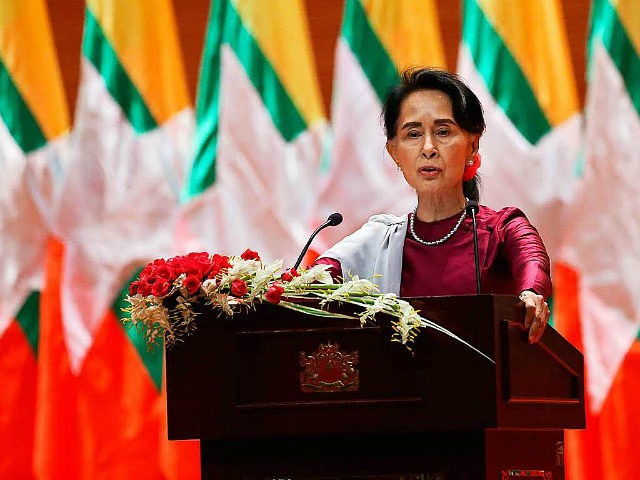On Tuesday, the effective (but not official) leader of Myanmar, Nobel laureate Aung San Suu Kyi, gave her first major speech on the Rohingya crisis.
Reviews of the address from international observers have been mixed, with some applauding her for unambiguously condemning human rights violations, while others say she appeared to question whether the Rohingya are suffering such violations at the hands of her government.
“There has been much concern around the world with regard to the situation in Rakhine. It is not the intention of the Myanmar government to apportion blame or to abnegate responsibility. We condemn all human rights violations and unlawful violence,” said Suu Kyi from the capital city of Naypyitaw, in a speech to parliament delivered in English. The speech was delivered to a wide public audience by radio and television, which is somewhat unusual for Myanmar.
Suu Kyi said her government was “committed to a sustainable solution” for “all communities in this state.”
This could be taken as a fairly bold statement since a substantial portion of Myanmar’s populace does not wish to recognize the Rohingya Muslims as either citizens or permanent legal residents. In fact, as the BBC points out, the government of Myanmar avoids using the term “Rohingya,” preferring “Bengali Muslims,” which implies they belong in Bangladesh.
Suu Kyi herself did not refer to them as “Rohingya” in her address. However, she did say refugees who fled to Bangladesh would be allowed to return after a “process of verification.”
The BBC notes that Suu Kyi appeared to invite international scrutiny for security operations in Rakhine state while also insisting that “clearance operations” ended two weeks ago. This claim has been disputed by reporters who say they have seen villages burned more recently. For that matter, both international observers on the ground and satellite photographs suggest some large fires are still burning in Rohingya areas.
The Washington Post observes that Suu Kyi treated the Rohingya exodus to Bangladesh as a baffling mystery rather than the intended result of attacks by vigilante groups and the Myanmar military. She cast doubt on reports of human rights abuses by speaking of “allegations and counter allegations,” and she insisted it is a “little-known” fact that “the great majority of Muslims in Rakhine State have not joined the exodus.”
Suu Kyi’s speech was reportedly well-received in Myanmar but not by international human rights groups, which have grown increasingly frustrated and disappointed with her silence on the Rohingya issue.
“Aung San Suu Kyi today demonstrated that she and her government are still burying their heads in the sand over the horrors unfolding in Rakhine State. At times, her speech amounted to little more than a mix of untruths and victim blaming,” said Amnesty International Regional Director James Gomez.
“There is overwhelming evidence that security forces are engaged in a campaign of ethnic cleansing through murder and forced displacement. While it was positive to hear Aung San Suu Kyi condemn human rights violations in Rakhine state, she is still silent about the role of the security forces in this,” Gomez said.
Gomez also doubted Suu Kyi’s sincerity for saying she welcomed international scrutiny, pointing out that Myanmar has repeatedly refused to cooperate with U.N. investigators.
“Aung San Suu Kyi is either completely out of touch or willfully blind to the realities of what her army is up to,” said BBC analyst Jonah Fisher. “It is simply not credible to say we don’t know why more than 400,000 Rohingya have fled. The evidence is being gathered every day in the testimony of refugees.”
Fisher added that Suu Kyi was either misinformed or dishonest when she claimed in her speech that residents of Rakhine State have access to basic services such as education and health care. Reports by international observers have made it painfully clear this is not true.
Law professor Penny Green of Queen Mary University told CNN that Suu Kyi’s sole use of the word “Rohingya” was when she referred to the Arakan Rohingya Salvation Army (ARSA), the militant group whose attacks kicked off the current crisis. “She chooses to use the word in relation to a terrorist group, that means that is the only identity that Rohingya will be attached to, from her perspective and she hopes from the international perspective,” said Green.
“I think that she was trying to claw back some credibility with the international community but was not prepared to go far enough,” said Phil Robertson of Human Rights Watch.
He gave Suu Kyi some credit for “saying the right words” but said there was not enough substance behind them. Like almost every other critical observer, he found ominous undertones in her comment that not every Rohingya civilian has fled to Bangladesh, which seems like an attempt to question or dismiss the crisis.
“When she says that 50 percent of the Muslim villages are still present in Rakhine state, what are we talking about? Fifty percent are gone. Fifty percent are burnt out. Fifty percent is a failing grade,” said Robertson.
Many of Suu Kyi’s critics noted that Myanmar’s complex political situation means she might have felt nervous about speaking out too strongly against the Rohingya “clearance operations” for fear of enraging the military that controlled her country — and kept her under arrest — until a few years ago.
Chinese and Russian representatives were notably more impressed with Suu Kyi’s speech than the average international observer, with officials from both countries expressing continued support for Myanmar.
“There are not reliable proofs, evidence to make such a condemnation, genocide and ethnic cleansing, no evidence,” said Nikolay Listpopadov, Russia’s ambassador to Myanmar.

COMMENTS
Please let us know if you're having issues with commenting.